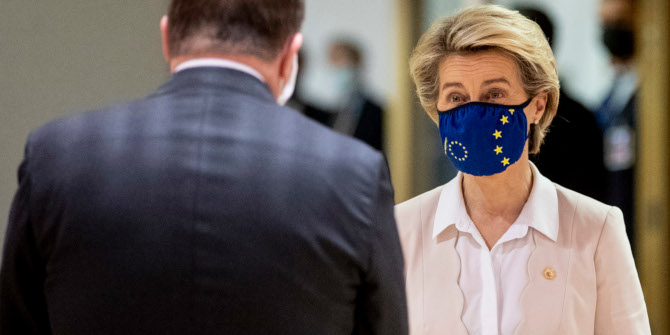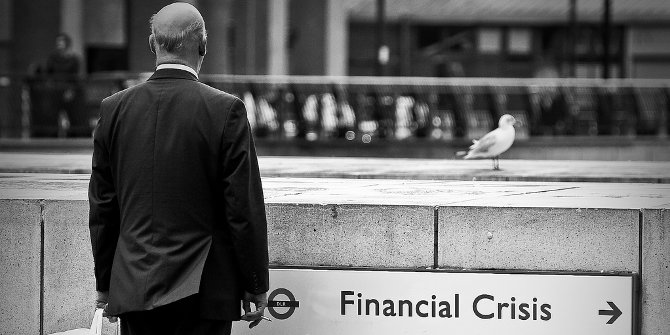The European Commission has faced intense criticism over the slow rollout of Covid-19 vaccination programmes in EU states. Angelos Chryssogelos assesses what the affair tells us about the EU’s aspirations to become an effective strategic actor.
The vaccine crisis, where the EU found itself in a public feud with a pharmaceutical company and facing a diplomatic emergency with the UK over vaccine export controls to Northern Ireland, has raised obvious questions about the EU’s internal governance and vaccination programme. Less obvious, but perhaps more important, however, is what the crisis says about the EU as a strategic actor.
The analogy between health and foreign policy is less far-fetched than it appears at first. Like foreign policy, health is an area of national competence with EU authorities holding a mostly coordinating role. Negotiations with pharmaceutical companies, which the EU undertook on behalf of all its members, have a strategic dimension during a pandemic. Nominally, the EU negotiated with market actors, but as has become painfully clear, it was competing with other states for priority in the vaccine queue. In short, vaccines are today a test for any actor’s claim to ‘strategic sovereignty’, and the crisis has revealed numerous shortcomings on the part of the EU.
First, the vaccine debacle has revealed the overbearing influence that national priorities have on EU actions, especially in an area where member states maintain a large degree of discretion. By most accounts, the crisis was triggered by restive public opinion and party politicking in Germany, where federal elections will take place in autumn, followed quickly by complaints in France. There have also been reports that the hastily announced export controls were promoted inside the Commission by actors closely aligned to some national capitals. While it had a strategy in place, the Commission was forced to bend to the impatience of member states.
Second, the handling of the crisis casts doubt on one of the main elements that proponents of a ‘strategic Europe’ have been touting: the use of economic tools for strategic goals. The EU’s clumsy efforts to apply vaccine export controls backfired with the Northern Ireland blunder. Press reports have revealed a lack of coordination between directorates as well as an overall lack of leadership from the top of the Berlaymont, the exact opposite of ‘strategic action’.

President of the European Commission, Ursula von der Leyen, speaking with Swedish Prime Minister Stefan Löfven, Credit: European Council
Third, in contrast to British efforts to facilitate research, development and production of vaccines early on, the EU approached the issue as a question of international economic negotiation, where it traditionally excels. It saw vaccine procurement as yet another area where, leveraging its size, it could get the best possible deal for European consumers while setting an example for the rest of the world – in sum, another opportunity to act as a ‘normative power’ per the academic cliché. But being normative is not always the same as securing one’s own interests in a time of emergency.
The vaccine crisis has shown starkly that self-identifying as a ‘strategic actor’ is very different to being one in reality. Most pressingly, the EU must seriously rethink the coordination between its political and economic tools. Creating a post with responsibility to evaluate the external consequences of all Commission actions, in cooperation with the European External Action Service, would be useful.
Fourth, this episode demonstrates that a ‘strategic EU’ need not always presuppose ‘more EU’. While in some areas common action will be necessary, in others action by member states – collectively, in groups, or in some cases even individually – may be more effective. In such cases, the Commission will have value as a hub for coordination and the exchange of information, a role that, if performed well, stands to increase its stature more than botched attempts at assuming new competences will. At the same time, if EU institutions are entrusted with handling a crisis, they must be allowed to put through their strategy without undue interference by member states.
Finally, the EU’s self-assured view of its strengths, like the size of its market and its reputation for policy competence, was belied by the success of smaller actors like the UK in securing vaccines. The EU’s position was also undermined by the decision to hastily jettison its self-avowed ‘normative’ role in favour of a more combative posture when things started to go wrong, ultimately making things worse. We can imagine all these patterns playing out in a foreign policy crisis – indeed there are shades of them in the dilemmas and indecisions the EU has faced in handling difficult relationships with Russia, China or Turkey.
In other words, the EU must be less self-referential when dealing with the outside world. Not all strategic challenges can be squeezed into the framework of prior policy and legal blueprints, and acting strategically requires serious preparation and thinking on the part of the EU rather than simply throwing its weight around. The policy and reputational damage of the vaccine debacle may appear significant, but the EU at least has the opportunity to emerge a more serious international actor if it takes these hard lessons on board.
Note: This article gives the views of the author, not the position of EUROPP – European Politics and Policy or the London School of Economics. Featured image credit: European Council



